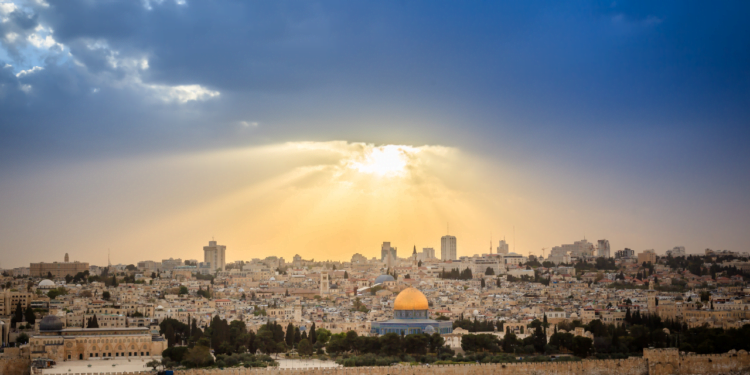No products in the cart.
A Prayer For Peace In The Midst Of The Israel-Palestine Conflict: A Biblical Perspective.
ADVERTISEMENT
This post contains paid and/or affiliate links. I make a small commission at no extra cost to you. Please see our Privacy Policy.
The Israel-Palestine conflict has been ongoing for decades. It’s about land, resources, and identity. Understanding its history is key.
Jewish Zionists started moving to Palestine in the late 19th century. After World War II, the State of Israel was formed in 1948. But, Arabs and Palestinians resisted, claiming the land as their own.
Over time, tensions grew, leading to wars and violence. The Six-Day War in 1967 and the Yom Kippur War in 1973 were major turning points.
ADVERTISEMENT
These wars led to Israel occupying territories, including East Jerusalem, the West Bank, and Gaza.
The conflict is complex, with many factors at play. Issues like Israeli settlements, Jerusalem’s division, and refugee rights fuel tensions. Natural resource control also plays a role.
The conflict has hurt both Israelis and Palestinians. Palestinians face occupation and limited resources. Israelis deal with violence threats and security concerns. Both sides have suffered greatly, making peace hard to achieve.
Approaching the conflict with empathy is vital. We must understand both sides’ historical grievances and hopes. Seeking peace requires acknowledging these complexities and working towards justice for all.
The Israel-Palestine conflict is deeply rooted. Knowing its history helps us understand the challenges in finding a solution. By acknowledging both sides’ grievances and striving for peace, a better future is possible.
Understanding the Biblical Perspective on Peace and Conflict Resolution

Understanding the Biblical Perspective on Peace and Conflict Resolution
The Israel-Palestine conflict is complex. The Bible offers insights for peace and reconciliation. It teaches us about shalom, harmony, and well-being.
The Bible talks about God’s desire for shalom. This means seeking a complete solution, not just stopping violence. In the Israel-Palestine conflict, this means finding a lasting peace.
ADVERTISEMENT
The Bible encourages us to be peacemakers. Jesus says, “Blessed are the peacemakers, for they will be called children of God” (Matthew 5:9, NIV). This shows the importance of working towards peace and understanding.
Advertisement. Scroll to continue reading.
Forgiveness is also key, as Jesus teaches in Matthew 6:14-15. Forgiving others can transform us and help heal communities. Forgiveness is essential in breaking cycles of violence and rebuilding trust.
Prayer is central to seeking peace. The Bible tells us to pray for our enemies and for conflict resolution. Praying for wisdom and guidance for leaders is important in finding just solutions.
ADVERTISEMENT
The Power of Prayer in the Israel-Palestine Conflict
The Israel-Palestine conflict has been ongoing, filled with violence and deep animosity. Seeking peace from a biblical view is key. As believers, we are called to be peacemakers. Prayer is a powerful tool we have.
The Bible shows prayer’s power in conflict. Psalm 122:6 tells us to pray for Jerusalem’s peace. This prayer is very relevant to the conflict. By praying, we align with God’s will for peace and reconciliation.
Prayer connects us with God and shapes our views. Matthew 5:43-44 teaches us to love our enemies and pray for those who persecute us. This command helps us overcome bitterness and approach conflict with compassion.
Advertisement. Scroll to continue reading.
Prayer can also lead to supernatural changes. James 5:16 says a righteous person’s prayer is powerful and effective. As we pray for peace, we can expect God to act and fulfill His purposes.
Prayer unites believers across different backgrounds. Ephesians 2:14 reminds us Jesus brought peace by creating one new humanity.
Through prayer, we can feel united with our Palestinian and Israeli brothers and sisters, despite our differences.
Praying for peace means interceding for both sides and seeing the humanity in everyone. We ask God to soften hearts and reveal paths to reconciliation. We also pray for leaders to find common ground.
We can pray for peacemakers and for emotional healing. We pray for families torn apart and for grassroots peace efforts. Prayer is more than a religious act; it’s a powerful force for peace.
Advertisement. Scroll to continue reading.
Promoting Reconciliation and Forgiveness during the Conflict
In the Israel-Palestine conflict, reconciliation and forgiveness are key to peace. Acknowledging pain and loss is essential. Yet, we must break the cycle of violence by promoting forgiveness and reconciliation.
Reconciliation means acknowledging past hurts and finding common ground. Both sides must talk openly and listen to each other. This builds trust and understanding.
Forgiveness is a process of letting go of resentment. It doesn’t mean forgetting or condoning past wrongs. Forgiveness heals and allows us to move forward together.
Creating a peaceful future requires many stakeholders. Religious leaders, community groups, and peace initiatives are vital. They help in dialogue, understanding, and promoting forgiveness.
The biblical perspective on reconciliation is key to peace in the Israel-Palestine conflict. The Bible calls us to be reconciled to God and each other. Jesus taught us to “love your enemies and pray for those who persecute you” (Matthew 5:44, NIV). This shows the power of forgiveness and love.
The Bible also talks a lot about forgiveness. Ephesians 4:32 says, “Be kind to one another, tenderhearted, forgiving one another, as God in Christ forgave you” (ESV). This verse tells us to forgive others, just as God forgave us.
It’s important for those affected by the conflict to follow these teachings. By doing so, they can help end violence and build peace. Prayer and action are powerful tools in this effort.
People can pray for reconciliation and forgiveness. They can pray for healing, changed hearts, and lasting peace. Through prayer, we can align our actions with God’s will and find the strength to promote peace.
Peace in the Israel-Palestine conflict needs everyone’s help. We must understand each other, find common ground, and follow the Bible’s teachings.
Through prayer and working for peace, we can hope for a future where everyone can live together peacefully.
Praying for Peace in Israel-Palestine
Prayer is essential during the Israel-Palestine conflict. It can change hearts, mend relationships, and bring reconciliation. By praying, we can help achieve a lasting and just peace. Here are some ways to pray for peace:
- Pray for the Leaders: Pray for the leaders of Israel and Palestine. Ask God to give them wisdom, compassion, and a desire for peace. Pray for their courage and humility.
- Pray for the People: Remember the civilians caught in the conflict. Pray for their protection, comfort, and healing. Ask God to meet their physical, emotional, and spiritual needs.
- Pray for Reconciliation and Forgiveness: Pray for reconciliation between Israelis and Palestinians. Ask God to soften hearts, break down barriers, and foster understanding and forgiveness.
- Pray for Justice and Fairness: Pray for a fair solution to the conflict. Ask God to bring a solution that respects the rights and aspirations of both sides. Pray against violence and injustice.
- Pray for International Mediation: Pray for the success of international mediation efforts. Ask God to guide them, grant them impartiality, and help them find common ground for peace.
- Pray for Humanitarian Aid and Support: Pray for humanitarian aid to those in need. Pray for organizations and individuals providing support and care to affected communities.
- Pray for Hope and Healing: Pray for hope and healing amidst the trauma. Ask God to bring transformation, reconciliation, and a future of peace. Pray for the next generation to grow up in peace.
Prayer is not just sitting quietly; it’s an action that requires effort. When we pray for peace in the Israel-Palestine conflict, we should also act.
We can work towards peace in our own communities. Our prayers should lead to actions that bring justice and understanding.
Together, we can seek peace as God wants us to. We can show the world what it means to make peace, as the Bible teaches.
Final Thoughts:
The Israel-Palestine conflict is filled with deep pain and violence. This article looked at the conflict from a biblical view. It showed how prayer and forgiveness are key to finding peace.
Understanding the history and biblical teachings on peace is important. By praying and working towards reconciliation, we can help solve this complex issue.
The conflict has a long, painful history. It has caused many deaths and left deep scars. Yet, there is hope for peace. The Bible teaches us how to find peace and reconciliation.
Prayer is a powerful tool in seeking peace. It brings comfort and guidance. By praying, we can overcome hatred and work towards peace.
Forgiveness is essential for peace. The conflict is rooted in past hurts. But, by forgiving, we can break the cycle of revenge.
Praying for peace in the Israel-Palestine conflict can be done in many ways. We can pray for leaders, victims, and communities. We can also pray for unity and understanding among religions.
Prayer can change the world. By praying together, we can make a difference in the Israel-Palestine conflict. Let’s pray for peace and a better future for all.
ADVERTISEMENT













